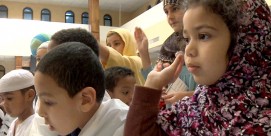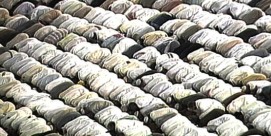BOB ABERNETHY: Three weeks ago, we told the story of, a Muslim, a CNN videotape editor, who lives in New Jersey, as he said good-bye to his family and took off for Saudi Arabia on his first religious pilgrimage, the hajj. Today, the story of Mubarak's hajj, reported by our correspondent Anisa Mehdi, herself just back from Saudi Arabia.
Anisa, welcome.
ANISA MEHDI: Good to be here. It was an inspiring trip, and I'm glad to be back, as is Abdul Alim Mubarak, back home now with his family in Maplewood. He had a three-week sojourn to Saudi Arabia. And as you'll see in a moment, his hajj was full of ups and downs. I was there for 10 days following him on his pilgrimage, a journey that was both exhilarating and arduous.
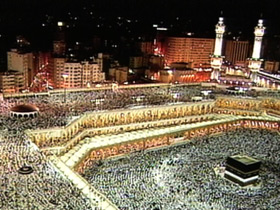
The pilgrimage begins in Mecca -- millions circling the Ka'aba seven times. From afar, or on TV, this looks like a galaxy beamed through a telescope. For Muslim Abdul Alim Mubarak of New Jersey, shoulder to shoulder with hundreds of thousands of pilgrims, breathing room was at a premium.
ABDUL ALIM MUBARAK: This was six grueling hours, and I was out in the blazing sun, and I had no cover on my head. I was out in the blazing sun, I was dripping, soaking wet with sweat. You wouldn't do this for an ordinary man, you only do this for Allah, you know. So you go through this process because you know that you're doing it for Allah, and Allah will reward you for it.
MEHDI: The ultimate goal of the hajj is the valley called Arafats, a few miles to the west. En route, pilgrims spend the night at this city of tents, called Mina, preparing for a one-on-one with God.
Mr. MUBARAK: When we go to Arafats, where it has been reported that Adam and Eve met, we go back to our origins, we go back to our spiritual origins, we go back to our human origins.
MEHDI: Arafats is the heart of hajj. Muslims believe that here, God accepts all prayers and will forgive a person's sins for the rest of his life.
(to Mr. Mubarak): Did you experience a nearness to God?
Mr. MUBARAK: Yes, I did, when I was making my supplications. The idea that my sins have all been forgiven and I'm feeling fresh and renewed as a new person, it's an incredible contemplation.
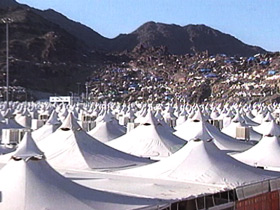
MEHDI: From Arafats, the millions move to Muzdalhifa, a place to gather pebbles the size of lentils. These will be thrown at stone pillars that symbolize Satan. According to the Qur'an, Satan taunted Abraham, telling him to ignore God's commandment to sacrifice his son. Abraham drove Satan away with stones.
Muslims reenact Abraham's faithfulness and throw stones symbolically as the many Satans that bedevil their daily lives and threaten society. It was at the Jamra, the place of stoning, that pilgrims died this year in a crush to complete the rituals on the last day of hajj. Religious fervor created a rush.
Mr. MUBARAK: These people aren't there to hurt you. You know, it's not like you're trying to find a seat on the subway in New York. They're passionate. Their zeal is to worship God.
MEHDI: Back in Mecca, the transformative power of the spiritual journey has begun to stir in Mubarak.
Mr. MUBARAK: I prayed to Allah for forgiveness, I prayed to Allah for guidance, I prayed to Allah for health, I prayed to Allah for wealth, I prayed to Allah to increase my faith.
ABERNETHY: Anisa, that was fascinating. The Ka'aba that you all walked around --
MEHDI: Yes.
ABERNETHY: Yes. What is that?
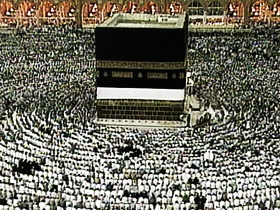
MEHDI: It's a stone structure, about 40 feet long, 50 feet high, covered in a beautifully woven black cloth with inscriptions of the Qur'an. And according to the Qur'an, the foundations of this building were raised by Abraham, the prophet Abraham, and his son, Ishmael. It's a little ambiguous about whether there might have been something there prior to this particular building of it.
ABERNETHY: But it's holy?
MEHDI: It is holy because it was the first house of worship for the one God.
ABERNETHY: We see in the pictures mostly men. What was it like there to be a woman -- be one of them?
MEHDI: There were lots of women there. I mean, there were as many Muslim women there as there were men, so I was not alone by any stretch of the imagination, but I was perfectly welcome, perfectly safe. I felt respected, and the Haram, the greatest mosque in Mecca, is the only place in the Muslim world where men and women are allowed to pray side by side.
ABERNETHY: And did you yourself throw pebbles at the devil?
MEHDI: I did. I collected some pebbles at Muzdalhifa, and I threw them at the devil. We all have devils, and I did it in joy, tossing them and saying, "Take that, I'm stronger than you, I'll beat you back."
ABERNETHY: I know it was hot, I know it was crowded, but what was it like spiritually?
MEHDI: Well, I've never before prayed with two to three million people all together in unison, and there's a great deal of power in that. And I believe Abdul Alim Mubarak experienced that too, and we're going to have a follow-up report in a few weeks, where he can talk about the transformation it had in his life. We'll hear from his family, too.
ABERNETHY: Anisa, many thanks. Welcome home.




